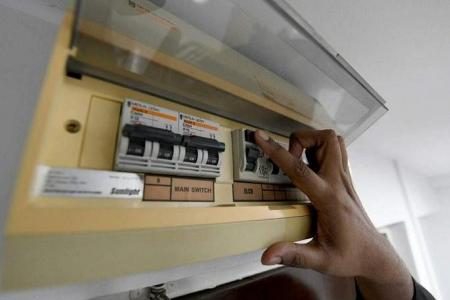All homes required to have circuit breaker installed from July 1
In a move to improve safety, all Housing Board flats and private residences will be required to have a residual current circuit breaker (RCCB) installed by July 1.
Home owners will be given a two-year grace period to get this done. Failing to do so by July 1, 2025 may lead to a $5,000 fine.
The Housing and Development Board (HDB) said it will cover the installation and rewiring cost for one- and two-room flats built in and before July 1985, while those staying in larger flats will get a subsidy of up to 95 per cent.
The RCCB prevents electric shocks by cutting off the supply of electricity when it detects a current leak, which may be caused by ageing or exposed wires, faulty electrical appliances or damaged insulation.
The installation of RCCBs has been a requirement in homes built since July 1985. Older homes which were rewired during renovation would have had an RCCB installed, in line with this requirement.
A small percentage of homes could still be running on their original circuits, which rely on fuses to protect against current overload, said HDB and the Energy Market Authority (EMA) in a joint statement.
A spokesman for EMA said that the new regulations were introduced by the agency to enhance the electrical safety of older homes that may not have an RCCB installed.
Those living in HDB flats built before July 1985, and without an RCCB installed, will be notified by the EMA to install one. Those living in private residences will also be asked to check and install an RCCB if their homes do not already have one.
An HDB spokesman said that the RCCB installation exercise will involve 83 one- and two-room flats and some 6,400 three-room or larger flats, all of which were built before July 1985.
EMA said it does not have the figures for private residences without RCCBs, but expect the numbers to be low, as these property owners would likely have renovated their premises and carried out re-wiring works since the 1985 regulation came into effect.
There are around 1.09 million HDB homes as of 2022, according to the Department of Statistics website.
HDB said that since December 2022 it has carried out RCCB installation works on eligible flats with the installation exercise slated to take two years.
Home owners are advised to contact a licensed electrical worker to carry out the RCCB installation and rewiring works.
Those staying in homes that already have an RCCB installed which is later found to be faulty, or not protecting all electrical circuits in their home, will not be penalised.
In 2020, an elderly couple and their son died after they were electrocuted by a wrongly installed water heater and RCCB in their Jurong flat.
Power to the water heater was supplied through a three-pin plug connected to an electrical socket. A double-pole switch connected directly to the home’s electrical circuit should have been used instead, said EMA senior associate engineer Goh Chin Fong at the coroner’s hearing.
The neutral and earth cables of the water heater’s three-pin plug were found fused together causing the current to flow back to the water heater’s tank and a metallic hose connected to it.
The flat, which had been occupied by the couple since the 1970s, had an RCCB installed but investigators found that it did not protect all the electrical circuits in the home, with only the unit’s utility room protected.
Investigations revealed that as a result of the improper installation of the RCCB, electricity leaking from the water heater did not cause a power trip, which would have cut off power to the flat.
Get The New Paper on your phone with the free TNP app. Download from the Apple App Store or Google Play Store now

